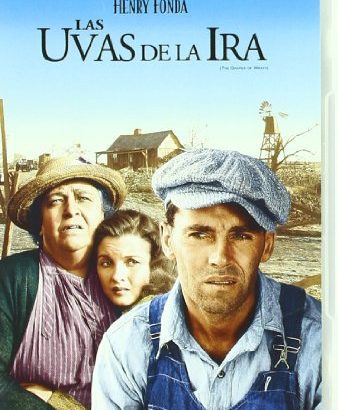
CINE FORO SOBRE CINE AMERICANO / “LAS UVAS DE LA IRA”: ASPECTOS A CONSIDERAR DURANTE LA VISUALIZACIÓN DE LA PELÍCULA PARA EL POSTERIOR DEBATE
El gran clásico del cine social americano de los años dorados de Hollywood, junto con El pan nuestro de cada día (King Vidor, 1934).
Grandiosa película, que compagina la indignación social con la emotividad, sin demagogia ni subrayados, siempre con los tonos justos, en su reflejo de la llamada Gran Depresión Americana, que estalló como consecuencia del Crash económico de 1929, la mayor crisis que ha sufrido el sistema capitalista de los Estados Unidos. Sobresale también la proverbial capacidad de su gran director, John Ford, para congeniar con los personajes, y lograr una empatía del espectador con ellos, por lejanos que nos resulten.
Sobresale también la fotografía de Gregg Toland, que había hecho esa labor en Ciudadano Kane, y que confiere un cierto onirismo barroco al tono de la película. Por otra parte, el guión rebaja la sordidez de la novela, por razones de autocensura.
Pertenece a la etapa en que el soberbio director John Ford trabajaba sobre todo para el productor Darryl F. Zanuck en 2oth Century Fox. Las dos películas anteriores de Ford para esta productora fueron El joven Lincoln (1939) y Corazones indomables (1939), que fueron justo las dos primeras que hace con el protagonismo de Henry Fonda, el protagonista de ésta. Justo ese año, Ford había conquistado una categoría de primer orden en el cine americano justo el año con La diligencia (1939). Dentro asimismo de la Fox, Ford volvió a reflejar la Gran Depresión al año siguiente mediante La ruta del tabaco (1941). En cuanto a Henry Fonda, esta película consolidó su imagen de héroe a la par firme y reflexivo.
Ganó dos Oscars, al director y a Jane Darwell por el papel de la madre. Henry Fonda, que también estaba nominado, lo perdió por el James Stewart de Historias de Filadelfia. Obtuvo un éxito comercial sobresaliente, el mayor de todas las producciones Fox del año.
La novela apareció en 1939, cosechando un éxito enorme y ganando el premio Pulitzer. El autor, John Steinbeck, diría de la película: “Es todo lo espléndida que una película puede ser”.



